Forest Whitaker and Oprah Winfrey lead the incredible ensemble cast that follow Cecil Gaines, who had a 34-year tenure serving as a White House butler in “Lee Daniels’ The Butler.”
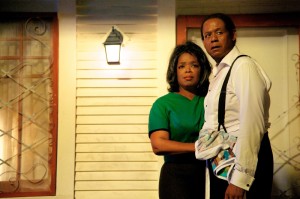
LEE DANIELS'” THE BUTLER
THE WEINSTEIN COMPANY
Rating: PG-13
Run Time: 126 minutes
Directed by Lee Daniels
Produced by Pamela Oas Williams, Laura Ziskin, Lee Daniels, Buddy Patrick, Cassian Elwes
Written by Danny Strong
Based on “A Butler Well Served by This Election” by Wil Haygood
Studio Synopsis:
Set against the tumultuous political backdrop of 20th century America, Academy Award® nominated director Lee Daniels’ (PRECIOUS) historical epic LEE DANIELS’ THE BUTLER tells the story of White House butler Cecil Gaines (Forest Whitaker), who serves during seven presidential administrations between 1957 and 1986. Inspired by Wil Haygood’s 2008 Washington Post article “A Butler Well Served by This Election” about the real life of former butler Eugene Allen, the film begins in 1924 with a young Cecil living in the fiercely segregated South and facing the tyranny of the region’s prejudices. After years spent working in a hotel, Cecil is discovered by a White House employee, which leads to landing the opportunity of a lifetime: a job as a server at 1600 Pennsylvania Avenue. There, Cecil becomes a firsthand witness to history and the inner workings of the Oval Office as the civil rights movement unfolds. At the same time, he and his volatile but loving wife (Oprah Winfrey) must grapple with the rebellious spirit of their son Louis (David Oyelowo) whose tenacious hunger for activism and equal rights often puts him in dangerous situations – and at perpetual odds with his father. While Cecil remains fiercely committed to his duties at the White House and to providing for his family, his determination leads to increasing tensions between him and his anti-establishment son. Through the eyes and emotions of the Gaines family, Daniels’ film follows the changing tides of American politics and race relations; from the assassinations of John F. Kennedy and Martin Luther King Jr., to the Freedom Riders and Black Panther movements, to the war in Vietnam and the Watergate scandal, Cecil experiences the effects of these events as both an insider and a family man. With an incredible supporting cast that includes John Cusack, Jane Fonda, Cuba Gooding Jr, Terrence Howard, Lenny Kravitz, James Marsden, Alex Pettyfer, Vanessa Redgrave, Alan Rickman, Liev Schreiber and Robin Williams, LEE DANIELS’ THE BUTLER is a story about the resilience of one man, the growth of a nation, and the power of family.
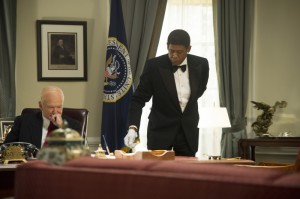
Jeanne’s Take:
In this film by Lee Daniels, the characters of Cecil and Gloria Gaines are based loosely on the lives of Eugene and Helene Allen. According to Wil Haygood’s article in the Washington Post, Allen worked in the White House as a butler from the Eisenhower administration in 1952 to the Reagan years in 1986. When he started at the White House, Allen could not even use the public restrooms in his native state of Virginia. Allen was 89 at the time of that 2008 interview, so he must have been born just after the First World War. He died in 2010.
With this newspaper article as a starting point, Daniels, who produced “Monster’s Ball” and directed the film “Precious: Based on the Novel “Push” by Sapphire,” takes literary license with the lives of the butler and his wife in order to emphasize the incredible changes in the lives of African Americans during the time the Cecil Gaines character worked below stairs at 1600 Pennsylvania Avenue, in the best job he ever had or ever hoped to have.
Daniels directed and Danny Strong (“Recount,” “Game Change”) wrote the screenplay for this intriguing and entertaining walk through the 20th century. Joe Kotz (“Precious”) edited the film, while Ruth E. Carter ( “Malcolm X,” “Teen Beach Movie,” “Amistad,” “Serenity”) handled costumes from the 1920s into the 1980s, with delightful glimpses of clothing and hair styles from bygone eras. There is a PG-13 rating due to use of the “N word,” along with authentic newsreel footage of civil rights marchers being beaten by southern deputies, police and your average civilian bigot with a club. For those who have seen the original news footage in classrooms, in libraries or who lived through it, these moments are horrifying to watch – police dogs attacking unarmed American citizens and fire hoses turned full blast on school children. Journalists from all over the world covered this state-sanctioned brutality, which helped America – and some of its presidents – find a conscience.
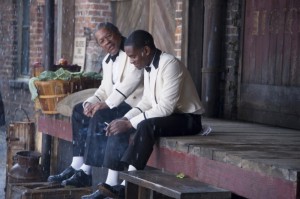
The “N word” is used historically rather than gratuitously. From the moment plantation matriarch Annabeth Westfall (Vanessa Redgrave) steps into the cotton field, after hearing the gunshot, she radiates resigned acceptance of the uglier aspects of slave labor conditions, but couples it with a silent determination to rescue this small black boy whose life has been altered so violently. The young Cecil Gaines (Michael Rainey Jr.) is in shock; she coaxes him into the “big house” and says she will train him to be a house “n—–h,” which is a step up from the cotton fields. So begins Gaines’ lifelong commitment to service, sufficiently skilled and subtle that you don’t even know he is in the room. When he leaves her service to run away, she does not try to stop him but rather puts a book inside his shirt; the plantation matriarch has taught him to read. Westfall sits with head lowered as he walks away while he looks back at her. After all, one is not allowed to show affection for a child of an alien race. It is a powerful moment.
In a seamless performance, Forest Whitaker (“The Last King of Scotland”) plays Cecil Gaines throughout his adult career, as the youthful runaway from Georgia creates a new life in North Carolina. Clarence Williams III (TV’s “The Mod Squad”) plays Maynard, Gaines’ first employer outside the plantation. He helps him learn an additional layer of service – he has to be stoic, silent and discreet. No emotion is to show, regardless of what Gaines experiences in the presence of the wealthy whites he serves. One thinks of “The Remains of the Day” with Anthony Hopkins as the butler.
“Look in their eyes. See what they want. See what they need. Anticipate,”
Maynard teaches the grateful youth. Gaines does not forget. When Gaines uses the “N” word and Maynard reprimands him sharply, telling him it is an ugly word and not to be used.
Mrs. Gloria Gaines is a woman who quit her job to stay home and raise two sons while her husband was a butler in the White House. In her first acting role since “The Color Purple” in 1985 and “The Women of Brewster Place” in 1989, Oprah Winfrey comments on the importance of this character. “Gloria is my aunt, my mother, my grandmother, never bringing her own dreams to fruition because family took precedence over everything.” Winfrey is outstanding as a woman who fights her own devils while she serves her family and waits for her husband to remember to leave the White House and come home to her.
Carter Wilson (Cuba Gooding Jr.) and James Holloway (Lenny Kravitz) are colleagues of Cecil Gaines who become his friends, their developing relationship displayed through richly woven dialogue on the job and in Gaines’ home after hours. Howard (Terrence Howard) as the playboy who tries to lead Gloria Gaines astray is irresistable.
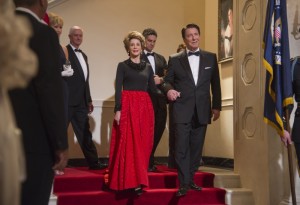
Of special interest to many will be the star turns taken by talented actors who play past presidents: Robin Williams as president Eisenhower, John Cusack as VP and then president Nixon, James Marsden and Minka Kelly as president Kennedy and his wife Jacqueline, Liv Schreiber as president Johnson and Alan Richman as president Reagan. Jane Fonda is spot-on perfect as Nancy Reagan. These performances are not caricatures; the actors are intent on capturing the essence of each man (and woman) whose beliefs and actions had an impact on the lives of the invisible black staff who served and served and waited.
Growing up African American meant exposure to subjects never touched upon in most other households. Young Cecil’s eyes are riveted on a lynching in his town: a black couple hanged together, corpses turning quietly in the breeze. Years later at the butler’s home in Washington DC, family and friends discuss the murder of 15 year old Emmett Till by southern whites. His mother insisted the casket remain open during the funeral in Chicago, so everyone could see what was done to her son. When the butler Gaines asks his family and friends where they got such information, they respond with the names of publications read in African American households: Jet magazine, the Pittsburgh Courier, etc. Black people were invisible in white publications; the tradition of black-owned periodicals began more than a century earlier.
Cecil Gaines and his peers provided domestic service to show how reliable and deserving they were of equal opportunity. His older son Louis (played by David Oyelowo) went to public school and college, an opportunity denied Cecil. Louis served by becoming a student of Martin Luther King’s passive resistance movement to draw attention to racial injustice. Watching black and white college students learn from an SCLC minister as he taught them gently and patiently how to endure insults and physical abuse, to practice the principles employed by Mohandas Gandhi, when they sit in at lunch counters to bring an end to segregation, is deeply affecting.
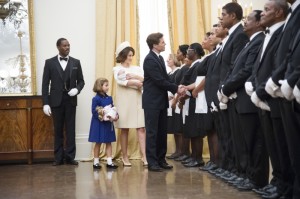
The federally mandated integration of Little Rock high school by Eisenhower, the civil rights marches in Selma during Johnson’s presidency, legislation steered through Congress by two presidents – one from each political party – the Freedom Riders who challenged segregation on interstate buses and the court-ordered integration of the University of Alabama while Kennedy was in office. It’s all here but shown by way of the inevitable conflict of generations, as the father Cecil Gaines continues to provide a stable home environment while his privileged son Louis sneers at his father’s way of life.
“The fires of discord are burning…. A great change is at hand.”
These words were spoken in a civil rights speech president Kennedy delivered to the nation. One of the most powerful moments in the film occurs when director Daniels places in juxtaposition the impeccably attired butler staff preparing for a formal state dinner in the White House, while 600 peaceful civil rights marchers in Selma, Alabama are being beaten with billy clubs and attacked with tear gas by state and local lawmen. Even though the events occurred two years apart, the fact is that three consecutive presidents felt compelled to address the nation on civil rights; and this is a breathtaking moment in the film, bringing into focus the double lives most people of color had to lead all the time.
And if you really don’t care to learn anyone’s history, if that is not your “thing,” then enjoy the wonderful costumes, hairstyles and music between the 1920s and the 1980s.
Besides the usual challenge of incorporating historic incidents into a film biography, there was the added distraction of a legal struggle over the right to use the name “The Butler.” Lee Daniels lost that fight to Warner Brothers, and had to be content with entitling his film “Lee Daniels’ The Butler.” With this film, Daniels distinguishes himself and burnishes his credentials as a director. Highly recommended for everyone, but be mindful of the PG-13 rating for preteens.
